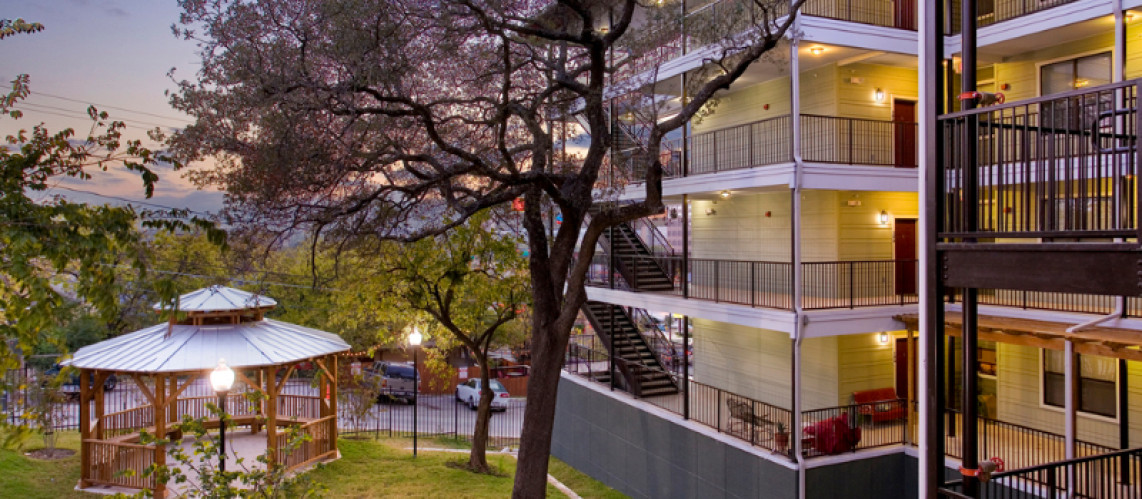September 21, 2022
RE: Stormwater Code Amendments
Dear Planning Commission,
The Austin Housing Coalition (AHC) encourages Planning Commission to consider the impact to affordable housing of the 2022 Environmental Code Stormwater Amendments associated with Resolution 20220609-061 and asks that the City of Austin pause any proposed code amendments until it is determined that they will not add cost to affordable housing development.
AHC supports water resource protection, reasonable environmental regulations, and policies that promote environmental sustainability. However, AHC feels that implementing the proposed stormwater code amendments would make affordable housing development far more expensive, leading to a reduction in affordable housing development overall and driving affordable development away from Central Austin. Both impacts run counter to City Council’s stated environmental goals, effectively promoting displacement and sprawl in an effort to address the environmental goals of the proposed amendments.
AHC understands that the Watershed Protection Dept. is drafting an Affordability Impact Statement (AIS) on the proposed amendments. We hope that this statement will wholistically consider how these changes will impact affordable housing development. Although the proposed amendments have been broken into two sets, we urge that the AIS consider the cumulative effects of implementing all the proposed changes on affordable housing. With increasing construction costs and rising interest rates, affordable housing developers cannot absorb any additional cost increases. AHC feels that any increase in development costs induced by these proposed stormwater amendments should be balanced with increased entitlements, carve-outs for housing, or other strategies for making affordable housing easier, not more difficult, to build in Austin.
In addition to our broad concerns about cost increases, AHC is particularly concerned about proposed code amendments 4 and 7 outlined in Resolution 20220609-061, which would ‘require that all subdivisions and site plans in Urban Watersheds meet steep slope protections’, and ‘require new and redeveloped properties to use greenfield conditions as a baseline when calculating drainage requirements’, respectively.
Proposed Amendment 4
Most of Central Austin, from Oltorf to 290, and Mopac to 183, falls into the Urban Watershed classification. Whereas currently, for sites within the Suburban Watershed, development may only occur on 10% land located on natural slopes over 15%, this proposed amendment would apply this requirement to the entire City. This greatly curbs developable area on sites with topography. Notably, most of the sites with slopes over 15% within the Urban Watershed are in West Austin. This proposed amendment
has the potential to further deter affordable housing development in this high opportunity part of central Austin, where housing advocates, including AHC have long sought to encourage more affordable housing opportunities. In expanding steep slope protections to all of Austin, we are driving up development costs and discouraging affordability in West-Central Austin, where there is already a severe shortage of affordable housing.
Proposed Amendment 9
Requiring greenfield conditions as the baseline from which impervious cover and drainage are calculated severely curtails developers’ ability to use and improve sites with high levels of existing impervious cover. To meet greenfield-based drainage requirements, costs for water quality and detention ponds will significantly increase. This policy would discourage development and improvement of high impervious cover sites, which under normal conditions offer developers an opportunity to build at a higher level of impervious cover while still improving drainage conditions.
Case Study: June West
June West, an 80-unit, 100% affordable family community is set to begin construction in 2022 on a 1.13-acre site in Brentwood. This project will bring much-needed affordable housing for families in Northwest Austin. Current conditions on this site have 94% impervious cover. The site size on this project requires an underground water quality pond, as there is not room for an above ground water quality pond. However, detention is not required because the overall impervious cover on the site is decreasing from 94% to 83%. With proposed greenfield development drainage standards, June West would require a detention pond large enough detain runoff for all proposed impervious cover onsite (83%). A pond this large would either not fit on the site at all, or would need to be buried under the building so deeply as to require a hugely expensive pump. Either way, these drainage requirements would render the project infeasible. This is 80 affordable units that would be lost as a direct result of this proposed policy.
AHC respectfully requests that Planning Commission reconsiders implementing these stormwater amendments without increasing entitlements and putting other policies in place that facilitate the development of affordable housing and offset the increased costs that would result from these changes. Where AHC recognizes that there will be ongoing discussions on the proposed code amendments, we look forward to continuing to engage on this matter.
Sincerely,
Brittany Baize
2022 Austin Housing Coalition Chair
EXECUTIVE OFFICERS
Brittany Baize
Chair
Family Eldercare
Abby Tatkow
Vice Chair
Austin Revitalization Authority
Alison Zarider
Secretary
Texas Association of CDCs
Michael Wilt
Treasurer
Chestnut Neighborhood Revitalization Corporation
Rachel Stone
Past Chair
Guadalupe Neighborhood Development Corporation

